Search
Search Results
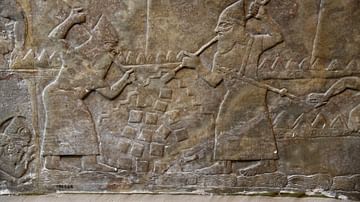
Image
Assyrian Soldiers with Iron Crowbars
Alabaster bas-relief depicting Assyrian soldiers using iron crowbars. Neo-Assyrian Period, 865-860 BCE. Detail of Panel 4 (bottom), Room B, the North-Palace Palace, Nimrud, modern-day Iraq. (The British Museum, London)
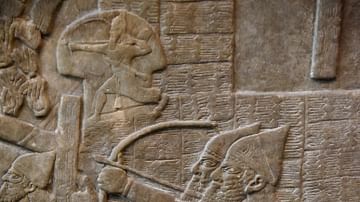
Image
Assyrian Archers Attacking a City
Alabaster bas-relief depicting Assyrian archers attacking a city. Neo-Assyrian Period, 865-860 BCE. Detail of Panel 4 (bottom), Room B, the North-Palace Palace, Nimrud, modern-day Iraq. (The British Museum, London)
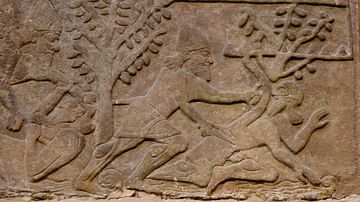
Image
Assyrian Soldiers Slaughtering their Enemies
Alabaster bas-relief showing defeated soldiers being seized and killed by Assyrian soldiers. Neo-Assyrian Period, 865-860 BCE. Detail of Panel 9 (top), Room B, the North-Palace Palace, Nimrud, modern-day Iraq. (Th British Musuem, London)
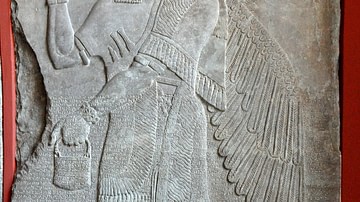
Image
Assyrian Protective Spirit, Nimrud
Alabaster bas-relief, depicting a standing human-headed genie or sage, from the North-West Palace of Ashurnasirpal II at Nimrud, Mesopotamia, modern-day Iraq. Neo-Assyrian Empire, 9th century BCE. Apkallu, a protective spirit, protects the...
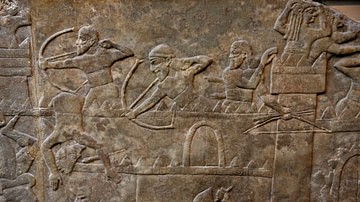
Image
Assyrian Army Assaulting a City
Alabaster bas-relief showing a massive and progressive Assyrian assault on a city. Neo-Assyrian Period, 865-860 BCE. Detail of Panel 4 (bottom), Room B, the North-Palace Palace, Nimrud, modern-day Iraq. (The British Museum, London)
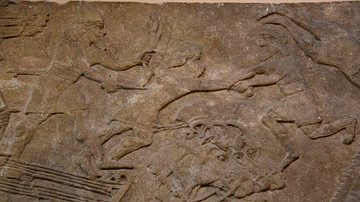
Image
Assyrian Enemies Trying to Escape
Alabaster bas-relief showing two defeated soldiers trying to escape form the Assyrian army. Neo-Assyrian Period, 865-860 BCE. Detail of Panel 9 (top), Room B, the North-Palace Palace, Nimrud, modern-day Iraq. (The British Museum, London)
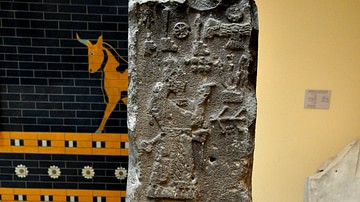
Image
Stela of the Assyrian King Adad Nirari III
Stela of Adad Nirari III, erected by one of the king's local governors, Nergal-Eres, found in Saba, Neo-Assyrian Empire, 810-783 BCE. The stela features the Assyrian King Adad Nirari III praying in front of god symbols, and the inscriptions...
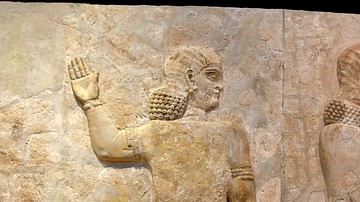
Image
Assyrian Master of Ceremonies
Alabaster-bas relief, part of a long tributary scene, where the Assyrian king, Sargon II (not shown here), stands majestically, waiting to receive the tribute from Urartu (modern-day Armenia). From the Royal Palace of Sargon II at Khorsabad...
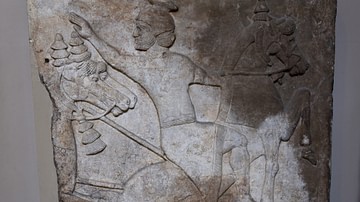
Image
Surrender of Horseman, Assyrian Relief
Assyrian relief, from the Central Palace at Nimrud (ancient Kalhu), Mesopotamia, modern-day Iraq, reused later in the South-West Palace, from the reign of Tiglath-Pileser III, c. 728 BCE. This scene, with a fleeing enemy horseman turning...
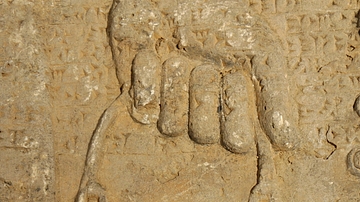
Image
Assyrian Ceremonial Bucket (Banduddu)
This is a close-up image of an Assyrian bucket (banduddu) held by a protective spirit (Apkallu). During certain ceremonies, this bucket was filled with a fluid and the Apkallu dips a pine cone (mullilu) into it; the Apkallu then sprinkles...